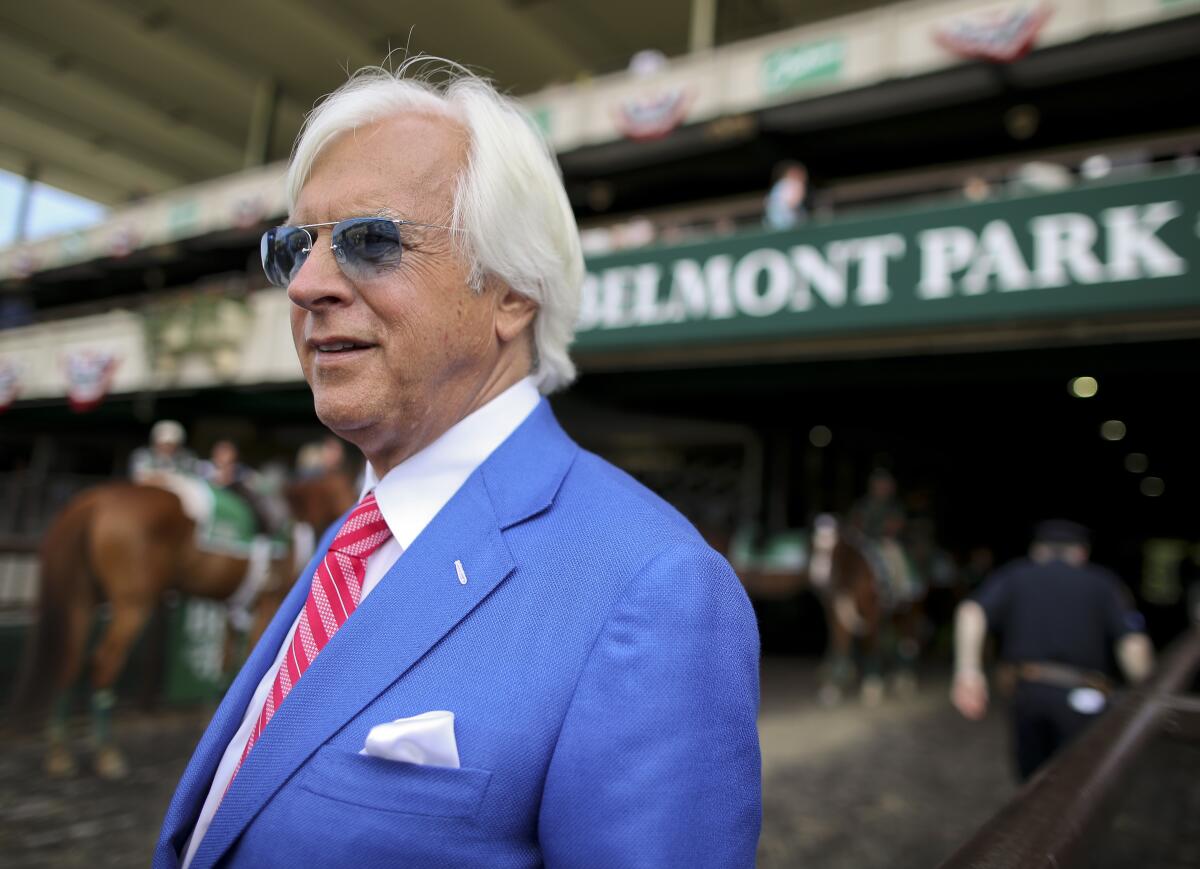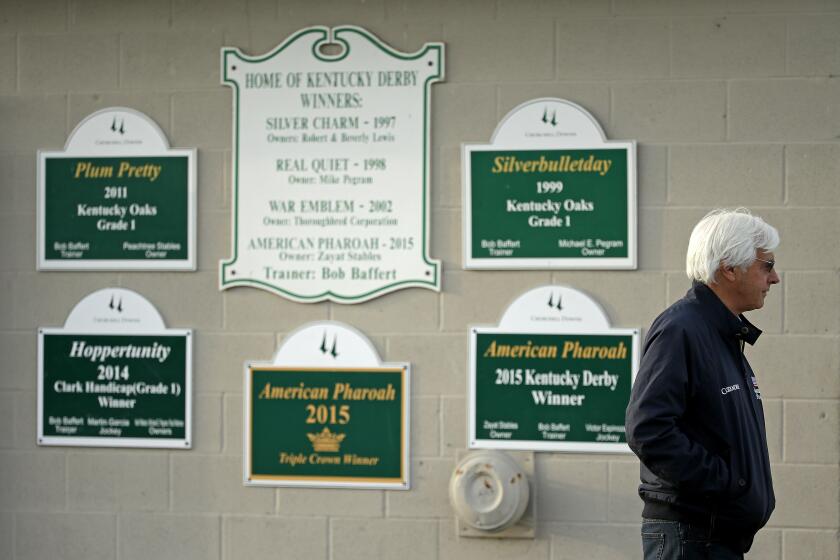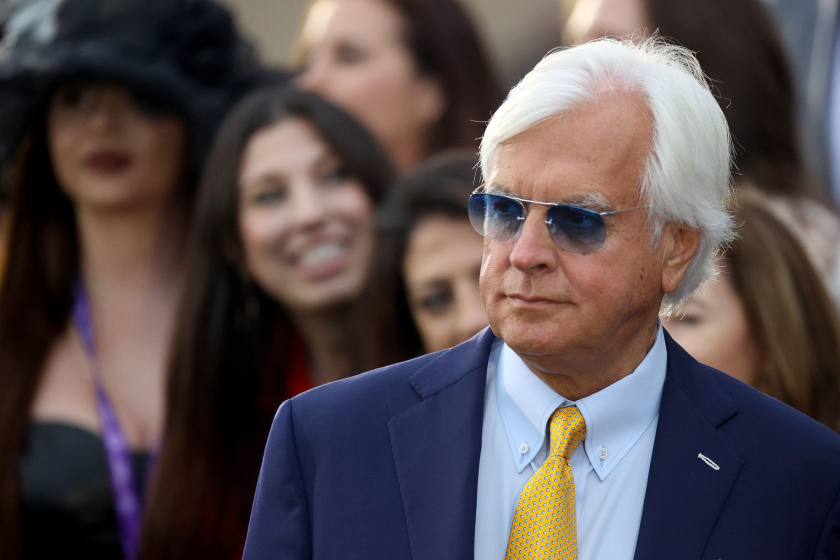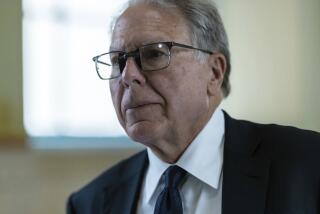Bob Baffert should be suspended from racing in New York for two years, hearing officer says

A retired New York State Supreme Court justice, acting as a hearing officer, recommended that thoroughbred trainer Bob Baffert be banned from horse racing in the state for two years. The recommendation is not binding and will go to a three-person panel, which is expected to accept the punishment.
The 50-page report by O. Peter Sherwood was issued on Saturday, but not announced by the New York Racing Assn. until Wednesday.
âDespite the fact that Bob has never had a single medication violation in New York, we expected this interim recommendation to the panel, which is not NYRAâs final decision,â Baffert attorney Clark Brewster said. âWe will contest this recommendation until we ultimately find a neutral, detached decision-maker that doesnât rubber stamp the NYRA lawyersâ demands.â
The Hall of Fame trainer was charged in December with three counts: conduct detrimental to racing, and to the health and safety of horses and undermining the confidence of honest racing by the patrons of NYRA. An initial ban was issued by the racing association on May 17 of last year, after the Preakness but before the Belmont Stakes. After many legal proceedings that filled the remainder of the year, Sherwood was named to be the hearing officer and he conducted proceedings Jan. 24 to 28.
KHRC taped phone calls with trainer Bob Baffert after he learned of Medina Spiritâs positive test. Transcripts show Baffertâs reaction.
The ban came after Medina Spirit, then winner of the Kentucky Derby, tested positive for an anti-inflammatory that is legal except on race day. NYRA cited seven medication positives over a 14-month period. Two of them in Arkansas were later found to be the result of contamination. Baffert had what his attorneys called a reasonable explanation for each of the positives, but taken together, NYRA said it painted a different picture.
Baffertâs attorneys argued that, given the concentration levels of the medications, they would not be performance enhancing, would not mask injuries and have no effect on the outcome of the races.
In his report, Sherwood said: âNYRA proved that each time Baffert was charged with a violation he provided an implausible excuse, and blamed others for his conduct that he, as the trainer, was responsible for as a matter of law.â
The judge was referring to a regulation, commonly known as the trainer insurer rule, which makes the trainer ultimately responsible for every horse and even actions taken by third parties without the trainerâs knowledge.
Brewster pointed out that NYRA was able to name its own hearing officer and chose Sherwood, who âopenly admitted he knew very little about horse racing.â
âOn the third day of the hearing, the judge asked the witness to explain what a paddock was,â Brewster said. The paddock is where horses are brought for schooling while in training and where they are saddled before racing.
Bob Baffert moves three Derby hopefuls to his former assistant Tim Yakteen. One horse goes to Kentucky-based Rodolphe Brisset, who helped prepare Justify.
The judge recommended that the ban start the first day Baffert applies for a license in New York, which can be no earlier than July 3. He is currently on a 90-day suspension from the Kentucky Horse Racing Commission for the Medina Spirit positive. During that time he cannot race anywhere in the United States. He will not be able to run in any of the Triple Crown races this year and has moved two Kentucky Derby starters, Messier and Taiba, to the barn of Tim Yakteen.
Sherwood did say the panel could consider giving Baffert time served for the 59 days he was suspended last year.
Both sides have seven days to respond to the report and the panel will then have 14 days to make a decision. The panel is made up of John J. Carusone, Jr., an attorney who is a member of a city advisory board that communicates with Saratoga Race Course and NYRA, William Alempijevic, executive director of the New York Thoroughbred Horsemenâs Assn., and Humberto Chavez, head of the New York Race Track Chaplaincy.
More to Read
Go beyond the scoreboard
Get the latest on L.A.'s teams in the daily Sports Report newsletter.
You may occasionally receive promotional content from the Los Angeles Times.













